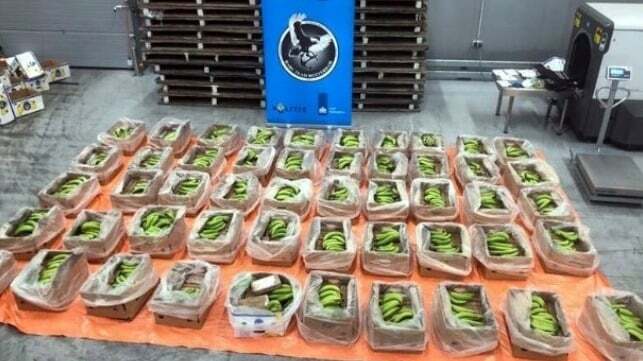
Cocaine Smuggling in Banana Containers at the Port of Rotterdam
A recent financial crime report by NASDA has highlighted that over $3 trillion in illicit money flowed through the global financial system in 2023[1]. A sizeable share of this illicit flow, amounting to USD 782.9 billion, is attributed to drug trafficking activities.
Various news outlets across Europe, including Radio France, have investigated drug trafficking networks that seem to be clustered around the north-eastern maritime seafront of the EU, namely Rotterdam (Netherlands) and Antwerp (Belgium). These ports have unwittingly become the arteries of a sprawling cocaine corridor[2]. The port of Antwerp in particular stands out due to its extensive 160 km of piers and the sheer volume of perishable goods it processes. These goods, while harmless on the surface, provide perfect coverage for drug traffickers, especially for concealing cocaine shipments from Ecuador. Such goods - bananas, pineapples, mangoes, fresh shrimp and cut flowers - cannot await clearance for long and make for perfect 'Trojan Horses'. Seizure of shipments in Antwerp has doubled over the past five years, exceeding 100 tons of cocaine for the first time in 2022.
The mechanics of this illicit trade are as straightforward as they are alarming. Ecuadorian gangs need to infiltrate ports which are, by nature, highly controlled and monitored areas. They need the help of port employees. Torrents of cash are evidently enough to reach their goal. In practice, a port employee is paid 10,000 euros in exchange for their port pass, providing access for smugglers to the port to retrieve their merchandise. It takes a 50,000 euros bribe for a container to be moved close to the port exit and away from cameras, and 100,000 euros to facilitate a completely undetected exit of a container from the port[3]. In international trade, time is of the essence. Nowhere is this more evident than in Rotterdam, where the processing time per container is just six seconds - a statistic that speaks volumes about the efficiency as well as the vulnerability of the system. The rapid movement of goods to tight timelines, coupled with entrenched corruption, enable this thriving illegal enterprise.
Economic and Social Repercussions
It becomes increasingly clear that the ramifications of these illicit financial flows are far-reaching. The sheer volume of criminal money circulating in the financial system not only represents a challenge for law enforcement and regulatory bodies, it also poses a threat to the integrity of legitimate economic sectors. Criminal funds, often laundered through ostensibly legal channels, have begun to seep into various parts of the economy, particularly real estate, business services, and hospitality. The Dutch and Belgian economies in particular face the risk of being flooded with dirty money, which is beginning to lead to unprecedented levels of violence and the erosion of societal norms. Given the interconnected nature of the financial sector this situation, alarming enough in the Dutch and Belgium context, also raises concerns about the spill-over effects into the broader European financial system, including the UK[4]. The real estate sector in particular has become a favoured avenue for money laundering - inflated property prices impact the housing market and broader economic stability not only in Belgium and The Netherlands, but other parts of Europe and the UK also.
Businesses in the hospitality sector, often reliant on cash transactions, are equally vulnerable to becoming unwitting participants in the laundering process[5]. The social ramifications of this activity are equally alarming. The surge in drug-related crimes, fuelled by the influx of cocaine through these ports, has led to increased violence and public safety concerns. Authorities are now facing crime typologies imported from South America with unspeakable acts of tortures and summary executions never seen before by European law enforcement. Neighbourhoods, particularly in the vicinity of these ports, face the risk of deterioration as they become hotspots for criminal activities. Moreover, the lure of easy money associated with drug trafficking and related crimes poses a significant risk to vulnerable young people, drawing them into a cycle of crime that can have generational impacts.
An obvious next point of entry, as enforcement actions progress in Antwerp and Rotterdam, are other North Sea ports such as Hamburg or Dunkirk. The ease with which goods, people, and money move across borders only exacerbates the situation. The permeation of criminal money into one member state's economy can swiftly impact others, given the integrated nature of the European financial system. This interconnectedness not only facilitates the spread of criminal activities but also complicates efforts to track and combat them.
Strategies and Solutions for Safeguarding Financial Services
The complexity and sophistication of these criminal activities demand equally robust and innovative responses from the financial services sector. To safeguard ourselves, we must adopt a multi-faceted approach. Needless to say, robust Know Your Customer (KYC) processes are essential. Financial institutions must ensure they have thorough knowledge and understanding of their customers' identities, business activities, and financial profiles. This is critical in preventing criminals from using complex corporate structures or international trade to launder money. Additionally, ongoing monitoring of transactions is key. Advanced analytics and artificial intelligence can come in handy, enabling firms to detect unusual patterns that may indicate money laundering or other financial crimes. The most important elements however are employee training and vigilance. Staff at all levels should know about the various forms of financial crime - especially those related to international trade, their typologies and indicators, and the procedures to follow when they suspect illicit and illegal activities. A well-informed workforce is the best defence against financial crimes!
************************************************************
References
1 - https://www.nasdaq.com/global-financial-crime-report
2 - https://www.theguardian.com/commentisfree/2024/jan/05/amsterdam-netherlands-drugs-policy-trade
3 - https://www.radiofrance.fr/franceinter/podcasts/les-histoires-du-monde/histoires-du-monde-du-jeudi-18-janvier-2024-8662379
4 - https://www.radiofrance.fr/franceculture/podcasts/le-reportage-de-la-redaction/anvers-porte-d-entree-du-trafic-de-cocaine-en-europe-1049080
5 - https://www.radiofrance.fr/franceculture/podcasts/cultures-monde/anvers-face-a-l-explosion-du-trafic-de-coke-5207660
Tom Vidovic is Senior Financial Crime Manager and Nominated Officer for Ghana International Bank, UK







